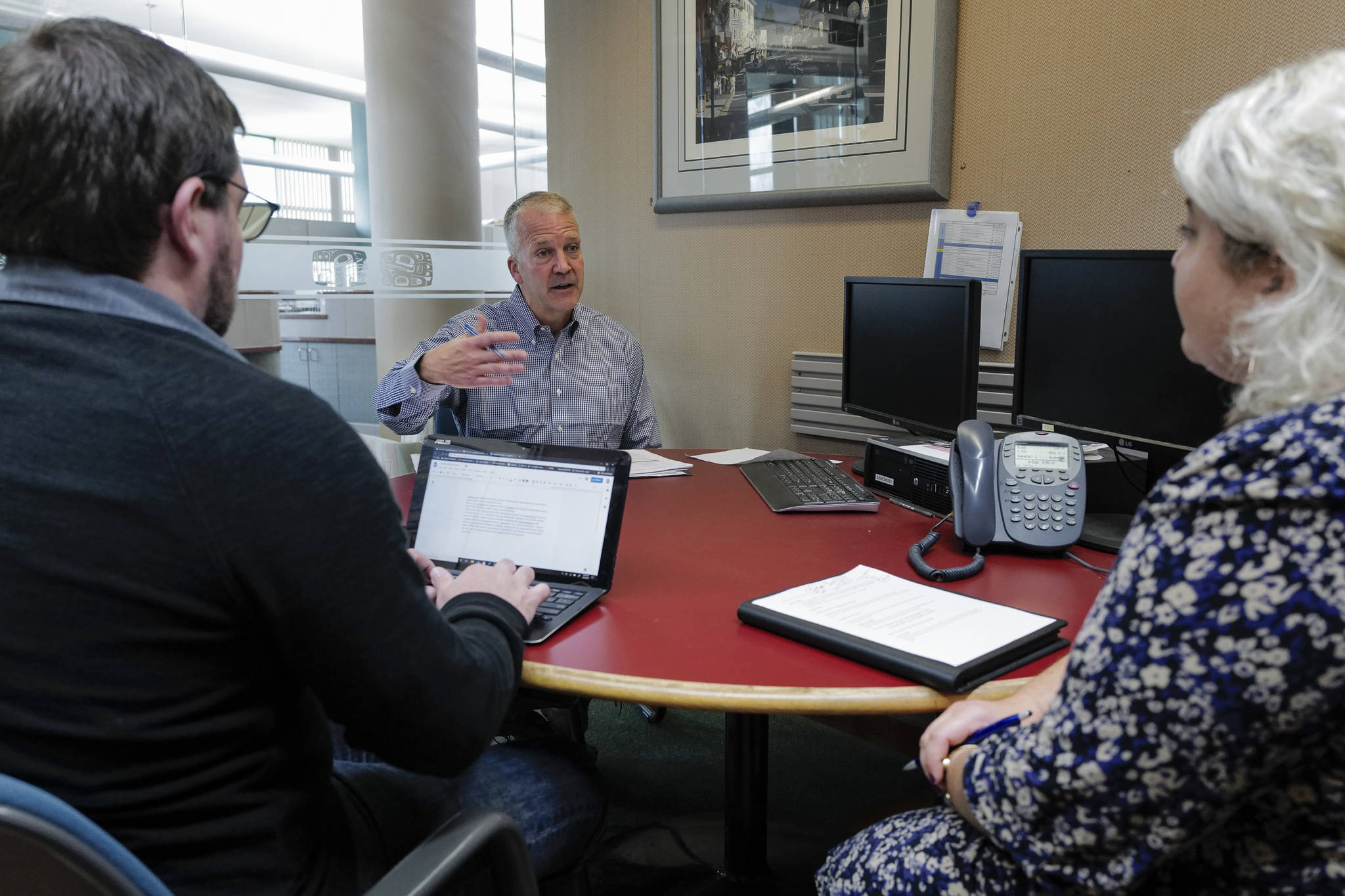Sen. Dan Sullivan, R-Alaska, stopped by the offices of the Juneau Empire this week to talk about his work on bills related to ocean pollution and domestic violence.
Sullivan was in Juneau to attend a roundtable meeting on transboundary mining with Sen. Lisa Murkowski, R-Alaska, and a number of state and local organizations as well as Canadian representatives.
Sullivan said he had been working on the Save Our Seas Act 2.0, a follow-up to last year’s act of the same name, which was signed into law in October. That bill provides a “serious and comprehensive approach to dealing with the ocean debris and plastic issue,” Sullivan said.
In addition to the cleanup efforts, the new bill provides an international component as well as incentives for research.
“It’s a very solvable environmental problem,” Sullivan said, because “it’s estimated that 10 rivers in five countries in Asia constitute (the source of) over 70% of ocean pollution, plastics.”
Sullivan said several countries in the region such as India, Indonesia and Thailand have “economies [that] are growing much faster than their waste management (capabilities are).”
So, the bill puts forward efforts to work with nations on their waste management, which has the added benefit of providing business opportunities for American companies, Sullivan said.
According to Sullivan, “We’re the best at doing this,” he said, referring to waste management in the U.S.
The bill would also create a public-private partnership fund that focuses on research for waste management and environmental technologies for plastics. He explained that some researchers would like to create a new kind of plastic that would biodegrade in salt water.
Sullivan called this yet-to-be-discovered technology the “Holy Grail,” and said there would be an incentive prize from the fund for technologies of this kind.
Save Our Seas 2.0 is still in the works, he said, but it is moving quickly and has a lot of bipartisan as well as private support, according to the senator.
“The way you get things done in D.C. is you get all the key stakeholders aligned, and it looks like they’re all aligned,” Sullivan said.
On Tuesday, Sullivan spoke at the Alaska Bar Association’s conference in Anchorage to promote his POWER Act, a bill aimed at providing services to victims of domestic violence, cosponsored with Sen. Kamala Harris, D-California.
This bill would encourage pro-bono work from lawyers to provide legal services for domestic violence victims “with the goal of literally having an army of lawyers who can do this,” he said.
The bill would provide victims of domestic violence with a lawyer, similar to how someone charged with a crime can be provided a public defender.
“Studies show that the best way to get a victim out of the cycle of violence that she often finds herself in is to get that person a lawyer. Then they can get protective orders, and they can use the law as a kind of a shield and a sword,” Sullivan said.
Lastly, Sullivan talked about his Coast Guard bill, which provides money for what the senator referred to as “assets and infrastructure,” ships, aircraft and places for them to be maintained.
“We’re building up not just the military throughout Alaska, but the Coast Guard,” he said. “More ships, more aircraft, even Navy ships. More infrastructure — it’s happening.”
He said he is encouraging the Navy to increase its presence in the Arctic, and that the U.S. is way behind many of its regional competitors.
“There’s the entire strategic competition that’s starting to happen in the Arctic domain,” he said. “With the Russians and the Chinese and the sea ice receding, sea lanes opening up, resources and transportation routes, we’re very much behind in terms of infrastructure.”
But Washington has been more responsive recently, and in his, bill Sullivan included more appropriations for ice-breaker ships and infrastructure projects.
Before he left the offices he was asked about the mass shooting that took place over the weekend in El Paso, Texas, and Dayton, Ohio.
He said that Alaska was unique in terms of its use of firearms in ways that can’t compare to other states.
“Of course it’s sickening and heartbreaking,” Sullivan said, but cautioned that rhetoric not turn too political. “When you look at what is the common thread, it’s the social alienation of young men, often sick young men fueled by social media. The problem is not legally owning a firearm but who owns the firearm.”
• Contact reporter Peter Segall at 523-2228 or psegall@juneauempire.com.

